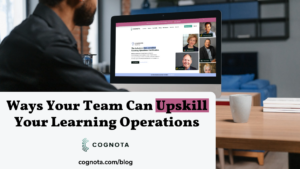We continue to focus on helping L&D teams optimize the course building process. It’s imperative that the process of building learning experiences proves valuable for all stakeholders, including the outsiders temporarily brought in to help build that course—namely, subject matter experts (SMEs).
No two course projects are identical. Indeed, what processes worked for one team may not necessarily work for another.
While we do not advocate re-inventing the wheel every time, it’s important to be predictive and have a few scenarios in mind when working with SMEs.
Understanding the different ways in which people work is critical for positive outcomes. Below, we’ve outlined several factors for you to consider so that the SME is set up for success.

Take the fuss out of working cohesively with Subject Matter Experts with this free downloadable toolkit:
The Secret Formula to Working with SMEs
Evaluate the level of subject matter expertise
This may seem like an odd suggestion because you might think that there’s no possible way of knowing whether the SME IS actually an SME in his or her field.
While no single professional knows everything there is to know about a topic, we suggest exploring this because the requested course may cover areas of the subject or industry that the SME does not know.
Be frank with the SME early on in the process. (This would be the Analysis phase in ADDIE.) If there are components to the course that the SME cannot fulfill, find another SME to help fill in the gaps. It’s better to cover this ground early in the process rather than later, perhaps during the Implementation phase, when QA notices gaps in the course which should have been addressed earlier.
Further, you do not want learners to complete the course and wonder why some topics were omitted—especially if they were explicitly mentioned in the training intake request form.
Evaluate the SME’s experience building courses
This is important because this can determine just how much hand-holding you need to give the SME.
Yes, many SMEs have years of experience in their respective industries, and many come from highly technical fields. This does not necessarily mean that they are expert course writers. As such, there could be some friction in getting them on board. Here might be some reasons why:
- They’ve never been asked to build a course using an authoring tool.
- They’ve been asked to build courses, but the courses were for professionals already quite familiar with the subject matter. (As such, they cannot communicate in layman’s terms.)
- As senior professionals, they’re used to someone else writing the course for them.
- They’ve written courses before, but only for very small groups, not large audiences
- They’ve only delivered PowerPoint or video presentations, and have difficulty organizing information logically into a course that would be engaging.
Wow, there could be challenges, indeed. How can you prepare yourself and your team when working with SMEs with potentially varied experience building courses?
The answer of course is…training (no surprise). Create a short intake form (yes, we love intake forms here at Cognota) for the SME to fill out shortly after she has been identified as the contributor for a course.
Then, have the SME undergo a short training during which you explain how L&D works with SMEs and what is expected of them in the course building process.
This will remove a lot of doubts on both sides and will ensure a much more smooth project.

Will you work with this SME again?
Perhaps this is an odd question, but if you plan on working with this SME again—and if this SME wields influence within your organization—then it makes sense to invest the time working with her to “show her the ropes” of course construction.
However, if this is a one-off project, with little likelihood of working with that particular SME again, then you might make other decisions for yourself and the team.
For example, you might simply wish to take the SME’s content and convert and format it into the course yourself without relying on the SME to do it. This could be a time-saver, removing frustration for both sides.
Staying flexible can help
Keeping an open mind—and practicing emotional intelligence—with SMEs goes a long way. Dealing with myriad personalities requires professionalism and grace.
Earlier we discussed the need to ascertain whether the SME is fully equipped to contribute all of the expert content for a course. Some SMEs are self-aware and let you know right off the bat, and others…well, perhaps not so much. If it’s a topic for which your team has built a course on an adjacent or related topic, do some research to figure out what gaps could exist.
As we’ve written before, keeping a network of SMEs ready to go will save headaches and time when building courses, especially for those clustered around a certain topic or industry.
In the end, you will become a subject matter expert on subject matter experts.
Need help collaborating quickly and efficiently with SMEs? You need Instructional Design Software.





